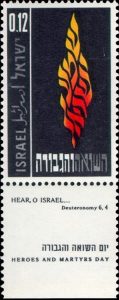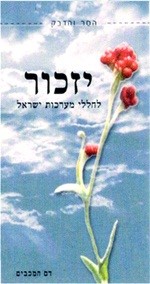The Seventh Day of Passover, or the Second Passover Holiday, was celebrated last week, on May 29.
Accordingly, we are entering the two weeks of National Holidays that were erected during the establishment of the State of Israel.
This content is sent to you after the Holocaust Memorial, marked on Sunday, May 5th, and will be followed by Memorial Day, adjacent to Israel’s Independence Day (May 13-14th).
Here are a few observations:
1. National Holidays Week and Yom Kippur are the most unique days in the Israeli calendar. If you have the opportunity to be in Israel, I recommend it because you will most powerfully feel the meaning of a Jewish state in the public atmosphere.
The national narrative is “From Holocaust to Independence”, so Holocaust Memorial Day was set a week after the end of the Jewish Passover holiday, which is the Holiday of Freedom.
From the holiday of freedom to a day that symbolizes the most absent freedom of the Jewish individual and collective. A week after Holocaust Day, we mark with contiguity the Eve of Memorial Day for Fallen Soldiers of the IDF, Memorial Day itself directly adjacent to the Eve of Independence Day, and Independence Day.
There is no independence without the heavy price of our young men and women sacrificing their lives for the people and the state’s existence.
In shaping this narrative, attention should be paid to the message the founding fathers sought to convey: Firstly, memorial days or Independence Day start in the evening and end in the evening, precisely like the Jewish holidays (“And there was evening and there was morning” Genesis 1:5), because the founders of the state saw themselves as Jews.
The date of Holocaust Remembrance Day is the 27th of Nissan, the date of the Warsaw Ghetto Uprising in 1943, out of the desire to emphasize the “new and fighter Jew” and not the “weak exiled Jew.” It is important to note that the Holocaust narrative was shaped by the Ghettos fighters, who survived and immigrated to the land of Israel. Their narrative was harsh and painful. In their eyes, a hero is the only one who fought his oppressors- in their case, the Nazis.
2. Memorial Day for Fallen Soldiers of the IDF was determined in 1950 on the Hebrew date of the 4th of Iyar (the day before Independence Day on the 5th of Iyar), following the request of the families of the fallen of the War of Independence to dedicate a special day to the fallen. Already on this date, there was a connection as a memorial day for the events of the Great Arab Revolt of 1936-1939 and the fall of Kfar Etzion in 1947.
3. Shaping the narrative is a political act. For the narrative to be accepted, it must become part of an ingrained Israeli culture.
How is this done? The actions can be divided into state institutions and individual actions.
The State has shaped the narrative with the following actions: determining special days on the calendar, devoting hundreds of hours within the educational system to educate on this ethos, ceremonies in schools, songs and programs on the radio and television channels, closing businesses by law on these national days, and sounding special sirens across the country which are respected with a moment of standstill silence. (Holocaust Memorial Day at 10 a.m., a two-minute siren; Eve of Memorial Day, a one-minute siren at 8 p.m.; and on Memorial Day at 11 a.m., a two-minute siren).
Since I was a young boy, I have liked to stand at my window and observe as cars, buses, and pedestrians came to a full stop mid-road to pay their respects to the fallen during the sirens.
Of course, the state does its best to shape the narrative, but it is the people of Israel who accept the days and the traditions and observe them vigorously (for example, wearing clothing that resembles the Israeli flag – Blue and white). Some traditions were not accepted, while civilians created others, like Zikaron BaSalon (“A memory in the living room”), which is a social initiative of informal gatherings in private homes during Holocaust Memorial Day, in which survivors tell their stories firsthand to participants. This private initiative is commemorated in houses all across Israel.
This year, the events and holidays will stand in the shadow of the October 7th massacre and the ongoing war. The atmosphere in Israel is “business as usual.” However, the feelings are harsh: the war in Gaza continues, and soldiers are killed or wounded almost daily; hundreds of thousands of people are still displaced from their homes in Northern Israel, and there are still over 100 kidnapped civilians in Gaza whose whereabouts are unknown. In addition, Hate and anti-Semitic propaganda have spread throughout universities and major cities around the globe.
I am writing this text on the Eve of Holocaust Memorial Day. It is hushed in the street, and no one is outside.
Tonight at dinner, my daughter Carmel (almost 3 years old) reminded us that we should go to the shelter during a siren. We tried to tell her that tomorrow at 10 a.m. would be a different type of siren, but she was concerned as she was too young to tell the difference.
In Israel, on the Eve of Holocaust Memorial Day 2024, many citizens feel that the events of October 7th, as horrifying as they were, cannot be attributed to a Holocaust. In 1939, we had no state or an army to protect us. Today, we have an army (even when it isn’t at its prime, it is still much more than we had then). The numbers, horrors, and inability to respond and protect ourselves differ radically. On the other hand, in various media, the connection is made between Holocaust survivors and survivors of the massacre at a music festival or survivors in communities attacked by Hamas terrorists. In my opinion, this equation is misplaced, and Holocaust events should stand on their own. Suppose one wants to relate the events of October 7th, it is more historically and narratively correct to tell them to the long chain of events that began with the beginning of Zionism and the return to the land of Israel, on our right to sit in this land and establish an independent state.
In the middle of the text is a stamp for Holocaust Memorial Day issued by the Israel Postal Service and a sticker placed on the shirt from young to old for Memorial Day with a blood-red flower (Helichrysum Sanguineum) symbolizing the fallen of Israel’s wars.
I will end on an optimistic note –
Even in national and personal hardships like these, I remember that Zionism and Judaism command me to be optimistic and active. This is the Jewish-Israeli commandment as depicted by Theodore Herzl: “If you will it, it is no dream”.



Hilik, very insightful post.
Well written. I too feel optimistic. We all hope for a better future.
Ezra, thanks!
We will stay in touch.